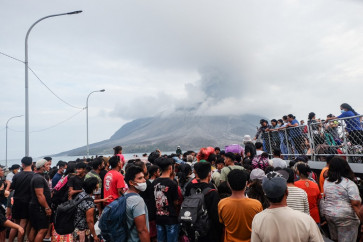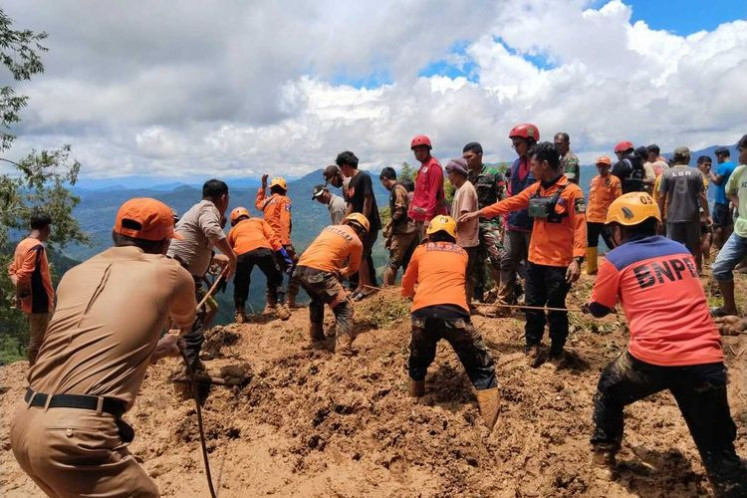Village-owned companies face challenges
The government has set up many village-owned businesses (BUMDes) in the country in an effort to drive the rural economy, but some have been facing difficulty in growing their businesses amid their struggle for greater community participation due to differing visions and a lack of competency
Change Size

T
span>The government has set up many village-owned businesses (BUMDes) in the country in an effort to drive the rural economy, but some have been facing difficulty in growing their businesses amid their struggle for greater community participation due to differing visions and a lack of competency.
Romdon Hadanursyamsih, a manager of the Karya Mandiri BUMDes of Hegarmanah village in Garut, West Java, said that the company had grown relatively well because it generally served to meet the daily needs of villagers.
However, its growth had stagnated because of difficulties in recruiting local residents to run the company.
“It is difficult to recruit all villagers, as we often find that they have a different vision from the current management on how to run the business,” Romdon told The Jakarta Post at a discussion on operating BUMDes in Ragunan, South Jakarta, on Friday.
Researcher Bhima Yudhistira Adhinegara of the Institute for Development of Economics and Finance (Indef) said that involving more villagers in operating BUMDes might prove inefficient, as most villagers lacked the necessary knowledge to run a business.
In contrast, researcher Sunarji Zamroni of the nongovernmental Institute for Research and Empowerment (IRE) in Yogyakarta believes that BUMDes should involve and employ as many villagers as possible to improve the community as a whole.
“BUMDes can be an instrument for [improving] welfare, and for that, they need collective action from the villagers. If the businesses are only controlled by a [handful] of people, they would be a huge missed opportunity,” he said.
To help foster community support for BUMDes, Bhima suggested that the businesses should focus on the needs of the local community. “If the villagers are mostly farmers, for example, the BUMDes should focus on the agrarian sector so they can improve the villagers’ income,” he told the Post by text message.
The BUMDes program was established through Village Law No. 6/2014 and are established through the village funds program to empower villages and gradually reduce their dependence on the central government.
The 2018 data of the Villages, Disadvantaged Regions and Transmigration Ministry shows that 45,549 BUMDes have been established in 83,913 villages, or 61 percent of all villages in the country. The figure is a significant increase from 1,022 BUMDes at the end of 2014, the inaugural year of the program.
Although their number has continued to grow, Bhima said that BUMDes were still riddled with problems that hindered growth, including limited human resource capacity, uncertain legal statuses, complicated establishment procedures and limited market access.
Sunarji made a similar statement regarding the focus on villagers’ needs, saying that BUMDes should be able to identify local problems and provide solutions through business models that fit the local socioeconomic environment.
“That way, BUMDes could also provide the social services that the villagers need, [and] they should stick to the [philosophy] of serving the villagers,” the IRE researcher said.
Karya Mandiri follows this principle of fulfilling local needs by serving Hegarmanah village’s garment printing business. The BUMDes also plans to expand into private loans.
“We are trying to protect our villagers from loan sharks and hopefully break the cycle of debt in the village, because it is really bad now,” said Romdon.
Another example is the Dewara BUMDes of Warungbanten village in Lebak, Banten. According to Lebak village head Jaro Ruhandi, the BUMDes facilitates the villagers’ activities by providing services like garment printing and money transfers.
“In the beginning, if our villagers wanted to make a T-shirt for an event, usually for schools, they had to order it from garment printing companies in Sukabumi [West Java], and the shirts usually ended up arriving late, so we decide to provide a garment printing service in the village,” he said.
Dewara also facilitates private money transfers through a partnership with state-owned lender Bank BRI’s BRILink service, as many Warungbanten residents do not have a bank account for transferring and receiving funds to and from friends and family. (mfp)









